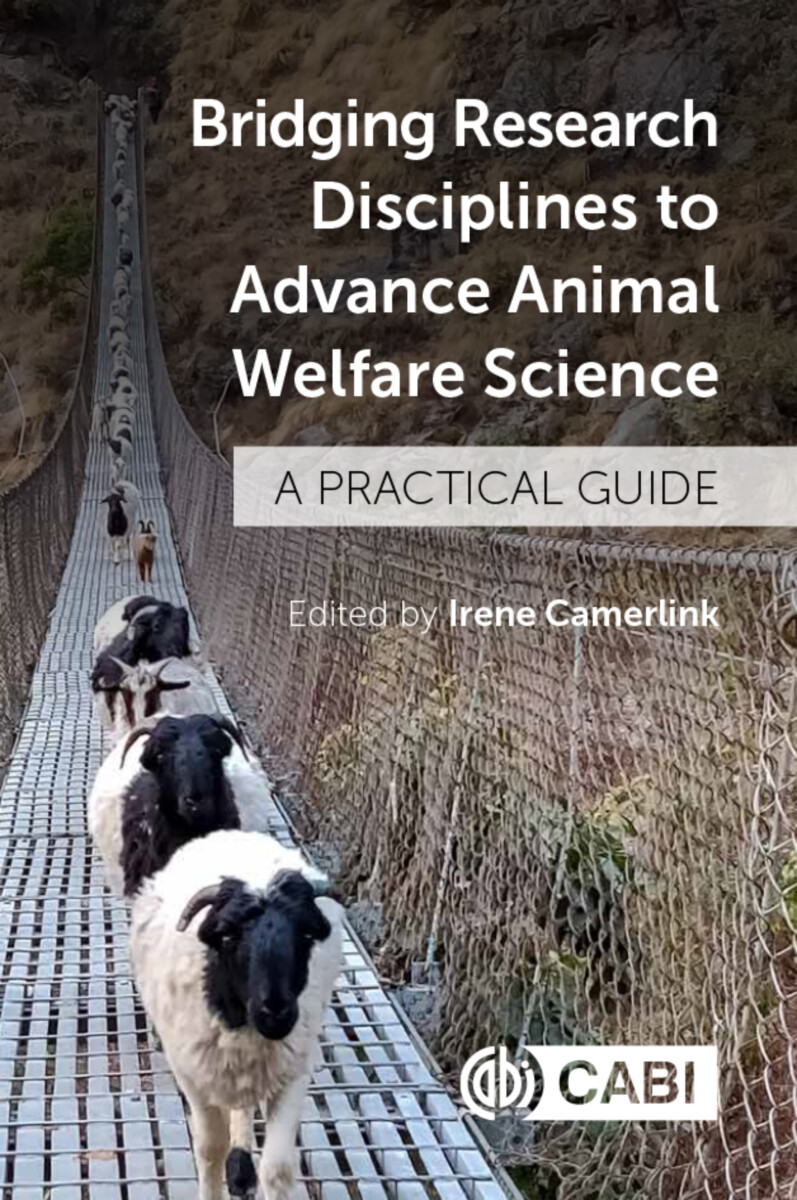Bridging Research Disciplines to Advance Animal Welfare Science
A Practical Guide
- Publisher
CABI - Published
7th April 2022 - ISBN 9781789247893
- Language English
- Pages 240 pp.
- Size 6" x 9"
- Publisher
CABI - Published
15th December 2021 - ISBN 9781789247886
- Language English
- Pages 240 pp.
- Size 6" x 9"
In recent years there has been a huge rise in interdisciplinary and multidisciplinary research in animal sciences which has accelerated improvements in animal welfare.
Down to earth and practical, this book gives guidance on how cross-disciplinary research can advance animal welfare. With numerous examples and case studies, the text explains:
- the different concepts regarding cross-disciplinary research
- how to set up cross-disciplinary research projects
- how to work in cross functional teams and models for effective team working
- how different fields can impact animal welfare, including social sciences, neurosciences, genetics, behavioral ecology and technology
Section 1: Crossing disciplines
1: Interdisciplinary research to advance animal welfare science: an introduction. Irene Camerlink.
2: Pragmatics for crossdisciplinary collaboration. Julie Thompson Klein.
3: Doing animal welfare transdisciplinary research with stakeholders; advantages, pitfalls and hands-on solutions. Tjard de Cock Buning and Marianne Benard.
4: Interdisciplinarity and the dilemmas of knowledge. Robert Frodeman.
Section 2: Applying other disciplines in animal welfare research
5: Human-centred research approaches to improve animal welfare: survey design and stakeholder involvement. Grace Carroll, Jenny Groarke and Lisa Graham-Wisener.
6: Human behaviour change models for improving animal welfare. Grace Carroll, Jenny Groarke and Lisa Graham-Wisener.
7: Applying economic models to assess the viability of animal welfare interventions. Rachel S.E. Peden and Faical Akaichi.
8: Application of psychometrics to assess quality of life in animals. Jacky Reid, Andrea Nolan, and Marian Scott.
9: Behavioural tests for learning and cognition in humans and animals. Rebecca E. Nordquist.
10: Using neuroscience for better understanding animals and their welfare. Irene Camerlink.
11: The microbiota-gut-brain axis in determining social behaviours of animals. Nienke van Staaveren, Paul Forsythe, Jerine A.J. van der Eijk, Dietmar Fuchs, Johanna M. Gostner, Claire Mindus, Bas T. Rodenburg, and Alexandra Harlander.
12: Improving animal welfare using genetic and genomic tools. Wendy M. Rauw, Jack C.M. Dekkers, Luis Gomez-Raya.
13: Epigenetic tools to identify stress and exposure to detrimental conditions in production animals. Carlos Guerrero-Bosagna.
14: Using principles from behavioural ecology to address animal welfare issues. Gareth Arnott, Victoria E. Lee and Simon P. Turner.
15: Practical considerations for the use of Precision Livestock Farming to improve animal welfare. Janice Siegford and Kaitlin Wurtz
Irene Camerlink
Dr. Irene Camerlink is an ethologist researching animal behavior and welfare, with a focus on the social behavior of pigs. She conducted her PhD at Wageningen University (Netherlands) and thereafter worked as postdoctoral researcher at SRUC (Edinburgh, UK) and the University of Veterinary Medicine, Vienna (Austria) before taking a position as Assistant Professor at the Polish Academy of Sciences, Poland. Throughout her career she has studied pig welfare by combining multiple disciplines such as genetics, ethology, behavioral ecology and social sciences. She has over 40 peer-reviewed scientific publications, which have been cited >558 times (Google Scholar), resulting in an h-index of 14. She is Senior Editor for the International Society of Animal Ethology (ISAE) and Editorial Board Member for the Nature journal Scientific Reports. She was editor for the book Animal welfare in Practice: Pigs. In 2017 she won the New Investigator Award of the International Society of Applied Ethology (ISAE). Her research interests are, amongst others, animal behavior and welfare, social interactions, pig husbandry, early life development, cognition, and the translation of research into practice.


